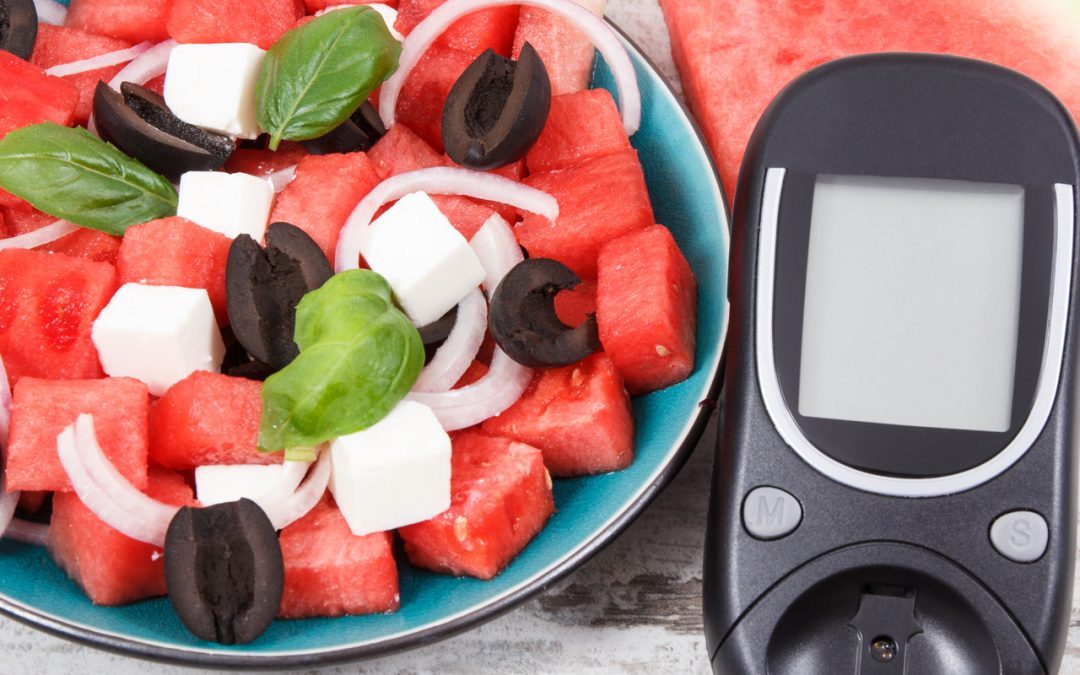Watermelon is a hydrating fruit that remains integral to every household during the summer. A chilled, juicy watermelon feels like a breath of fresh cool air in the scorching summer months. Everyone enjoys eating watermelon, but the question of whether or not people with diabetes can consume this fruit gets raised frequently.
One of the most common thoughts about watermelon is that people with diabetes must not consume it. However, contrary to the common assumption that it mainly contains water and sugar, watermelon is rich in nutrients. The advantageous bioactive components of watermelon can treat a variety of ailments. Furthermore, it also significantly reduces the risk of certain diabetic-associated complications.
People with diabetes can enjoy this fruit by making strategic decisions about how much to eat. Continue reading to learn more about the association between watermelon and blood sugar.
Watermelon and Diabetes
Elevated blood glucose levels characterise a condition known as diabetes. One of the causes of diabetes is the hampered beta cells in the pancreas. These cells are in charge of secreting the hormone insulin, which helps regulate blood glucose levels. Many severe complications, such as eye damage, cardiac issues, neuropathy, etc., can develop in the long run if you do not manage your blood sugar levels.
Watermelons have a marvellous nutrient profile, containing high moisture content and potent health-promoting chemicals. However, watermelon’s glycemic index (GI) is 80, making them one of the foods you must consume in moderation if you have diabetes. The Glycemic Index of watermelon depends on the portion and type of watermelon you eat. Furthermore, watermelon can also increase blood sugar levels because it contains carbohydrates similar to other fruits rich in high natural sugar, such as berries, grapes, oranges, etc.
Carbohydrate transforms into blood glucose or blood sugar after being digested. Therefore, the amount of carbohydrates you consume is proportional to the amount of glucose you consume. However, watermelon’s high fibre and relatively low carbohydrate content do not significantly raise blood glucose levels if consumed in moderation.
Is Watermelon Good for Diabetics?
There are not enough research findings focused on watermelon and diabetes. But, the few of them show that if consumed in appropriate amounts, watermelon could lessen diabetes complications. Regulating the quantity of consumption can prevent watermelon from negatively affecting your blood sugar levels. In contrast, overeating and frequent consumption of watermelon will lead to blood glucose spikes and nullify its positive effects.
According to investigations, hyperglycemia patients are more likely to experience cardiac problems. Elevated oxidative stress and LDL oxidation are the main contributing factors to this condition. High glycemic foods significantly increase glucose, and their auto-oxidation produces free radicals and cell damage. However, lycopene, an antioxidant, occurs naturally in watermelon and has hypoglycemic action.
Lycopene aids in the battle against free radicals and lowers the risk of diabetes, heart disease, and other conditions. It is relevant because cardiovascular diseases account for 68% of deaths in adults with diabetes over the age of 65. Studies also show that lycopene extract greatly enhances lipid and glucose metabolism.
The HealthifyMe Note
When consumed in moderation (i.e., 100-150 grams, 2-3 days a week) watermelon can be beneficial for people with diabetes. It is not particularly harmful, but it affects everyone differently. Hence, it is better to consult an expert nutritionist to identify your portion size and the correct ways of consumption. However, the general strategy is to track your carbs, understand a food’s glycemic index, and monitor your blood sugar levels.
A Nutritionist’s Tips on Eating Watermelon While Managing Diabetes
- Health professionals and nutritionists advise diabetic people to limit their daily intake of watermelon to 100 grams. In addition, you must consume them 2 to 3 days weekly rather than daily.
- Every part of a watermelon is edible. Moreover, the watermelon seeds are jam-packed with nutrients like omega-3, omega-6, zinc, proteins, potassium, etc. Therefore, consuming it at recommended levels is beneficial.
- Watermelons, owing to their high moisture content, help people control their cravings for sweet foods and keep their stomachs fuller for longer. You can have it as a snack by mixing half a cup of diced watermelon with a cup of Greek yoghurt or adding it to a salad.
- Since every individual is different, the best way to determine how watermelon affects your blood sugar is to test 1-2 hours after consuming watermelon using a CGM or glucometer. If your blood sugar is 50 points higher than the normal range, you must cut back on the portion.
Conclusion
Eating in moderation is the key to healthy living and managing chronic conditions like diabetes. Fruits and vegetables are crucial for those with diabetes, and the sweetness of watermelon shouldn’t discourage you from incorporating it into your diet. Consider the total amount of carbohydrates to keep your blood glucose in range. You can always speak to the health experts from the HealthifyMe team to know more about watermelon and how you can include it in your diet.


